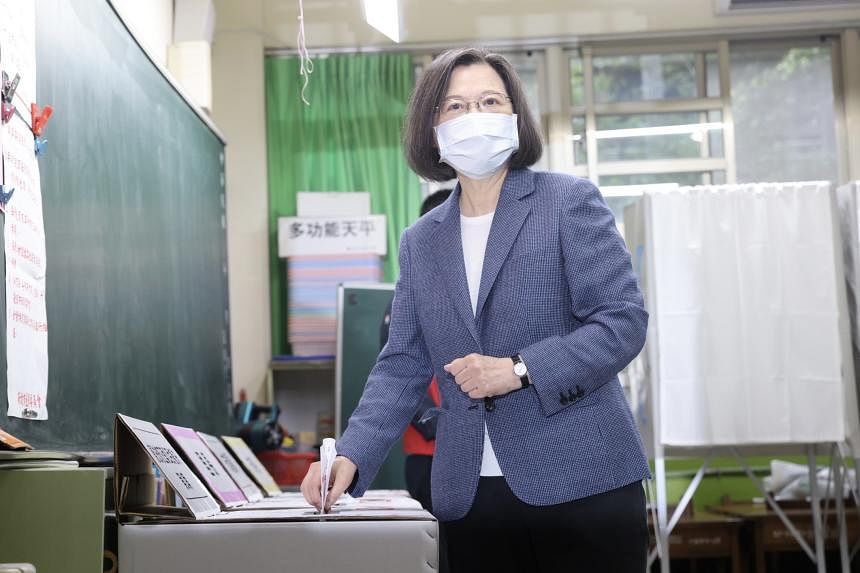- Joined
- Aug 29, 2008
- Messages
- 27,373
- Points
- 113
Taiwan President Tsai resigns as chair of ruling party after it suffers major defeat in local elections
1 of 4
The local elections were seen as a midterm test of Taiwanese President Tsai Ing-wen's rule. PHOTO: DEMOCRATIC PROGRESSIVE PARTY

Taiwan’s President Tsai Ing-wen bows after announcing her resignation as the head of the ruling Democratic Progressive Party. PHOTO: EPA-EFE

Kuomintang candidate Chiang Wan-an after winning the Taipei mayoral election on Nov 26, 2022. PHOTO: AFP
Supporters of the Kuomintang celebrate the preliminary results of the local elections in Taipei on Nov 26, 2022. PHOTO: REUTERS
Yip Wai Yee
Taiwan Correspondent
TAIPEI – Taiwan’s President Tsai Ing-wen has resigned as chair of the ruling party after it suffered a major defeat in Saturday’s local elections seen as a midterm test of her rule.
In particular, her independence-leaning Democratic Progressive Party (DPP) lost the closely watched mayoral seat in the capital city, which was won by the rising star of the opposition Kuomintang (KMT), Mr Chiang Wan-an.
About an hour after Mr Chiang claimed victory in Taipei, Ms Tsai announced she was stepping down as chairman to take responsibility for the DPP’s poor performance.
“We humbly accept the outcome, and accept the decision of the Taiwanese people,” she said at a press conference, bowing deeply. She added that Premier Su Tseng-chang also offered to resign, but she has asked him to stay on.
Mr Chiang had beaten both the DPP’s candidate, the former health minister Chen Shih-chung who was the face of Taiwan’s Covid-19 fight, as well as independent candidate Huang Shan-shan, who was the city’s former deputy mayor.

Kuomintang candidate Chiang Wan-an celebrates after winning the Taipei mayoral election on Nov 26. PHOTO: AFP
“I will lead Taipei to realise its potential…. I want the world to see Taipei’s greatness,” the 43-year-old mayor-elect said in his victory speech while thanking his cheering opponents.
Mr Chiang is set to replace Mr Ko Wen-je of the small Taiwan People’s Party (TPP), who cannot stand again after two terms in office.
This contest was under the limelight, not only because it is for the highest post in the capital city, but is also seen as a stepping stone to the presidency.
The Taipei mayoral race was part of the island’s municipal elections where voters elect officials spread across nine levels of administration, ranging from neighbourhood chiefs to city councillors and mayors. More than 19 million Taiwanese, or 82 per cent of the population, were eligible to vote, including 760,000 first-time voters.
In total, the KMT claimed victory in 13 of the 21 city mayor and county chief seats up for grabs, compared with the DPP’s five. Independent candidates took two seats, while the TPP took the mayorship in Hsinchu.
Besides Taipei, the KMT’s Simon Chang snatched the Taoyuan mayorship from the DPP, whose Cheng Wen-tsan has reached his two-term limit. The fight to retain this seat had been challenging for the ruling party throughout its campaign after its original nominee, Lin Chih-chien, was forced to withdraw following a plagiarism scandal.
While these elections focus on local issues such as a neighbourhood’s road improvement work or a city’s recycling efforts, they have important implications for the different political parties as they set the stage for Taiwan’s presidential and legislative elections in 2024. Ms Tsai must step down then as president as she cannot stand again because of term limits.
The local elections also have little to do with national issues such as cross-strait tensions, though the independence-leaning DPP had attempted to bring the China factor into its campaign.
Beijing, which views Taiwan as a breakaway province to be reunified with the mainland one day, by force if necessary, has stepped up military pressure on the island in the wake of United States House Speaker Nancy Pelosi’s visit in August, which China views as an infringement of its territorial integrity.
The DPP played up its strategy of “resisting China and protecting Taiwan” at a time of Chinese aggression in the hope that this would work to its advantage against the Beijing-friendly KMT.
“Taiwan is facing strong external pressure. The expansion of Chinese authoritarianism is challenging the people of Taiwan every day to adhere to the bottom line of freedom and democracy,” Ms Tsai told supporters late on Friday. She has also said multiple times on the campaign trail that the election results will influence how the world views Taiwan.
But experts noted how this campaign strategy never took off at these elections.
“At the local elections, voters don’t really care about party identification. They care more about personalities and the competency of specific candidates,” said Professor Wang Yeh-lih, a National Taiwan University political scientist.
Along with the local government elections, a referendum was held asking if the voting age should be lowered from 20 to 18. But it fell short of the threshold needed to pass, dealing a blow to groups pushing to bring the island’s voting age in line with most other democracies.
